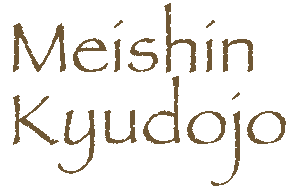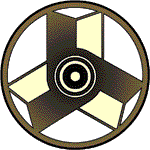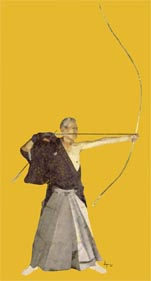
 |
|||

The Spirit of Kyudo
Our teacher, Hideharu Onuma sensei, believed that one's spirit was like a great oak tree, and in order for it to realize its greatest potential the seeds had to be planted early. He, of course, recognized the importance of technique; teaching that technique was the gateway to the spiritual level. But more often, he liked to echo the sayings of past kyudo masters and teach that "shooting with technique improves the shooting, but shooting with spirit improves the man."
Because the practice of kyudo involves little in the way of hard physical activity, spirit is extremely important. When the spirit is weak the shooting becomes dull and lifeless. Onuma sensei taught that if the spirit is strong one will appear like a deep-flowing river, calm on the surface but with tremendous power hidden in the depths. Compare that to someone whose internal spirit is weak. Like a small stream, they may appear powerful because of all their noise and turbulence, but underneath they are shallow and devoid of any real power.
Strict self-control and emotional stability are crucial to the development of one's spirit and to the practice of kyudo. But some are unwilling to adhere to the strict ceremonial procedures that the practice of kyudo requires. These people argue that any attempt at self-control stifles creativity. Attitudes such as this, however, are usually little more than an attempt to use unorthodox methods as a cover for insufficient skill or knowledge. True creativity is sister to the spirit and both are born of simplicity. They are not a product of the intellect, but surface only when the rational mind is quieted and the intuitive thought process takes over. The guidelines and procedures established for the practice of kyudo have been borrowed from generations of past teachers, and are designed to put the analytical mind to rest and allow the practitioner to move into a state of consciousness known as mushin (literally, no mind). And while some may associate a state of no mind with unconsciousness or even death, it is in truth a state where the remnants of thought are eliminated and only pure thought remains.
It is important to mention here that kyudo, by itself, cannot solve our problems nor add anything to our lives; at least not in the beginning. Kyudo may look simple but it is deceptively complex. Onuma sensei liked to tell us that the practice of kyudo made him feel like "A blind turtle in the middle of the ocean searching for a log." It is that complexity, however, that makes kyudo such a rewarding instrument for self-discovery. Its practice peels away the protective layers of ego that we all hide behind and allows our true nature to be revealed. It is then our responsibility to examine the results and balance our character accordingly. Perhaps the best way to explain the spirit of kyudo is to put it in Onuma sensei's words: "When shooting, sometimes we will hit the target but miss the self. At other times we will miss the target but hit the self. Our purpose, though, is to hit the target as the self and hope that the sharp sound of arrow penetrating paper will awaken us from the so-called 'dream of life' and give us real insight into the ultimate state of being."

 |
||
| This site is maintained by Dan and Jackie DeProspero, co-authors with their teacher, Hideharu Onuma Hanshi, of the books Kyudo: The Essence and Practice of Japanese Archery and Illuminated Spirit: Conversations with a Kyudo Master http://www.kyudo.com.html—Revised April 2, 2012 Copyright © 1998 Dan and Jackie DeProspero |
||